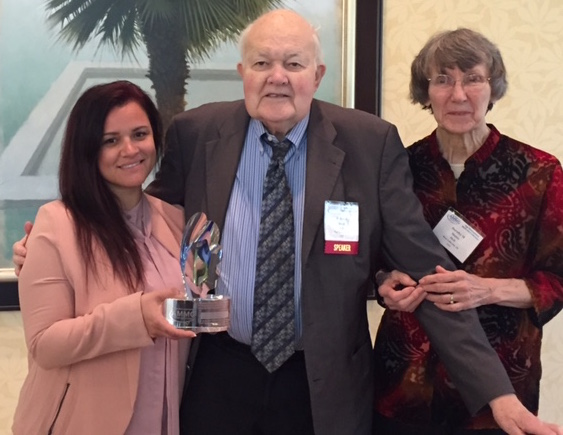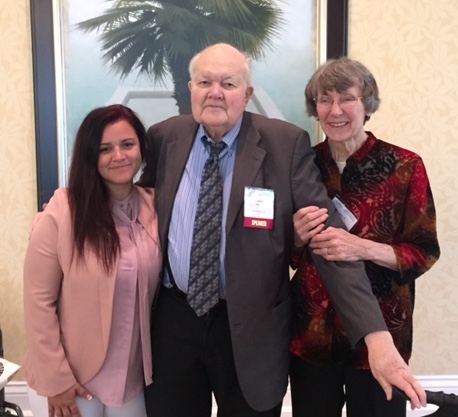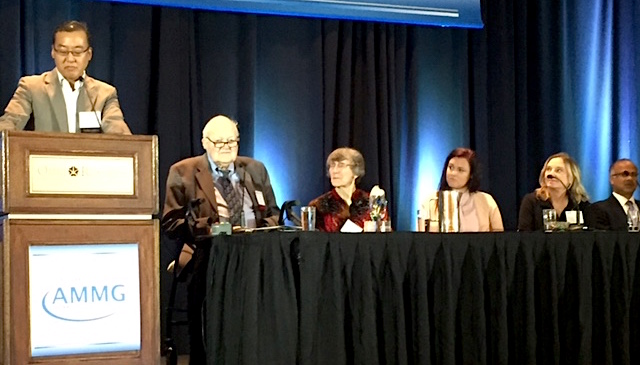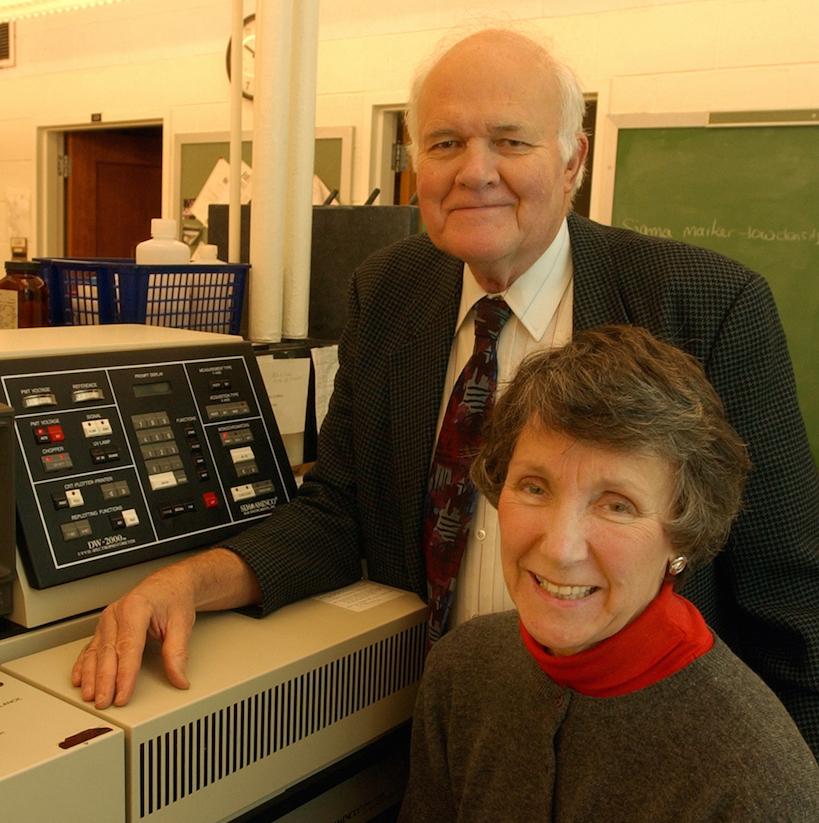
AMMG Presents First L. Stephen Coles, M.D. Award for Research and Science Innovation in Aging and Age Management Medicine
Jeff Morris
|
The First L. Stephen Coles, M.D. Award for Research and Science Innovation in Aging and Age Management Medicine was presented on Saturday, May 14, 2016, at the 20th Clinical Applications for Age Management Medicine Conference in Orlando, FL. The recipients of this first-ever Coles Award were D. James Morré, Ph.D. and Dorothy M. Morré, Ph.D. The unusual double presentation was at the request of James Morré, who pointed out that Dorothy has long been his full-time research partner as well as his wife. Both were instrumental in the discoveries that were the subject of his presentations at the November 2015 and May 2016 AMMG conferences, and for over 50 years of work that led to this award.
 
|
Natalie Coles (left) with Drs. D. James Morré and Dorothy Morré following presentation of
the L. Stephen Coles Award
Dr. D. James Morré received his doctorate in biochemistry from the California Institute of Technology in Pasadena, and was the Founding Director of the Purdue Center for Cancer Research, 1976-1986. He is the author or coauthor of more than 750 papers and reviews and is listed among the 300 most-cited authors in science by Current Contents, with 3,065 citations for the 14-year period between 1965-1978.
Since the early 1980s the Drs. Morré have devoted much of their professional careers to development of technology based upon the ENOX proteins, and specifically, the ENOX2 proteins, also known as Tumor-Associated NADH Oxidases (tNOX), which were discovered and characterized by the pair during their tenure at Purdue University, where Dorothy was professor of foods and nutrition in Purdue's School of Consumer and Family Sciences. In 2009, James retired from Purdue University and joined NOX Technologies, Inc., located in the Purdue Research Park, as Director of Research. D. James and Dorothy Morré are co-discoverers of the cancer-specific subfamily of ECTO-NOX2 proteins upon which the ONCOblot Tissue of Origin Test is based and which serves as the therapeutic targets for Capsol-T intervention. They are co-owners of MorNuCo, Inc. established in 2011 with personnel and space previously belonging to NOX Technologies, for the express purpose of furthering the clinical development of both technologies.
“ENOX2 is the only molecular marker identified anywhere in the genome that has the potential to be a universal cancer specific marker,” James Morré told the E-Journal last December. “This is something that most investigators have given up on. When we started out, the general explanation was that ‘cancer is not a single disease, it’s a hundred different diseases and there will never be anything that is common to all cancers.’ We had the foresight to realize that there was a common feature of all cancer cells, and that was unregulated growth. So we basically attacked the growth process and dissected it, and tried to identify new components that were in the growth process that might become unregulated in cancer. And that led to the discovery of ENOX2. There is a rationale now to have a universal marker of cancer, and that universal marker is ENOX2. And there may never be another one, but certainly we have one, and for most purposes, diagnostic purposes, intervention purposes, one is sufficient—it’s universal.”
“Normal cells are totally under the regulation of growth factors and hormones,” he explained. “Unless they have a signal to grow they don’t grow. Whereas once a cell produces ENOX2, the ENOX2 is unregulated, and it simply keeps the cells in cycle all the time. So you have unregulated growth as well as invasive ability, the ability to metastasize, to invade normal tissues, to get into the bloodstream—this is what clinically defines cancer.” But, he said, if these cancerous cells' unregulated growth is interrupted by 48-72 hours, they tend to undergo programmed cell death, so one could conceivably eliminate a cancer very early in its development with the appropriate interventions. "That’s saying an ENOX tends to be very specific. An ENOX2 targeted intervention, if you can keep these cells from dividing, from proliferating, eventually the majority of them or maybe all of them would undergo apoptosis, and the cancer would no longer be a problem for the patient. That’s kind of our goal, that with proper interventions we could deal with early cancer; we would not necessarily have to know exactly where the cancer is. In some cases, one might be able to assume watchfulness, like in the breast for example, we could monitor more regularly until one finds a surgically resectable lesion—but on the other hand it might be possible to intervene much earlier than that.”
The Morrés' ultimate goal is a shift from standard cancer interventions that have almost exclusively been developed to treat advanced disease—usually after the onset of clinical symptoms and metastatic spread—to safe, early interventions, directed to cancers too small to be easily located by standard imaging techniques for surgical resection. In other words, the ability to relegate cancer from an acute, frequently fatal, disorder to that of a chronic, potentially curable, illness.
Reaction to James Morré by AMMG conference attendees has been dramatic. “I was struck by the number of our physician attendees who, after hearing Dr. Morré's lecture, commented that this guy was going to get a Nobel Prize for his work and were anxious to get their photograph taken with him," said Greg Fillmore, AMMG Conference Director.
 At the Coles Award presentation (L to R): Edwin Lee, M.D., D. James Morré, Ph.D., Dorothy Morré, Ph.D., Natalie Coles, Florence Comite, M.D., and Derrick DeSilva, M.D. At the Coles Award presentation (L to R): Edwin Lee, M.D., D. James Morré, Ph.D., Dorothy Morré, Ph.D., Natalie Coles, Florence Comite, M.D., and Derrick DeSilva, M.D.

James and Dorothy Morré at Purdue University in 2003
Return to May 2016 e-Journal 
|